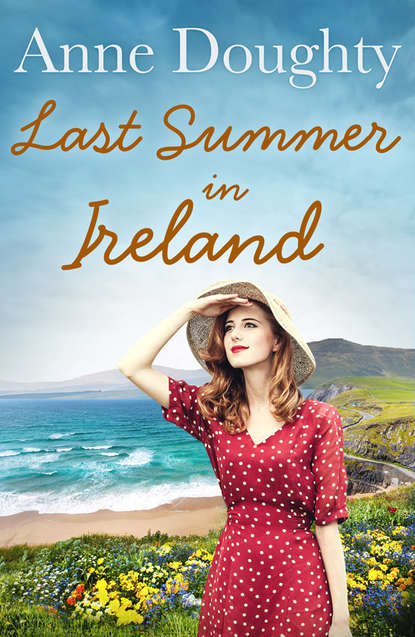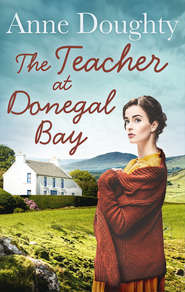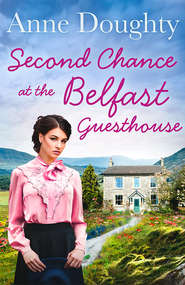По всем вопросам обращайтесь на: info@litportal.ru
(©) 2003-2024.
✖
Last Summer in Ireland
Автор
Год написания книги
2019
Настройки чтения
Размер шрифта
Высота строк
Поля
A voluminous, black figure appeared at the foot of the pulpit stair, mounted purposefully, ran his eye over the congregation and threw his arms in the air.
‘Brethren, let us ask forgiveness for our manifold sins.’
I bowed my head gratefully. I prayed for the energy to stand up and slip noiselessly down the aisle, now, when no one could stare at me too obviously, because they were supposed to be bowed in prayer.
But my prayer went unanswered. My legs received no strengthening power and my hands began to sweat profusely. I could shield my eyes from this ranting figure, but about my ears I could do nothing.
How I got through that service I shall never know. I remember I kept hallucinating on the sight of William Neill’s battered car. I could see myself crossing the road, hurrying across the White Walk and along the side of the cricket pitch to where it would be parked, but instead I sat with my head throbbing for over an hour, unable to shut out anything going on around me or coming back to me from a past so painful I had been doing my best to forget it for years.
When the organ finally gave the signal to depart, I had to hold on to the pew in front of me as I got to my feet. Of walking back down the aisle, I remember nothing. A crush of bodies in the vestibule, words I couldn’t distinguish. And then, the miracle. I have never stopped believing in miracles. Parked at the foot of the steps where no one except the minister ever parks was William Neill’s car.
He’d spotted me before I was able to distinguish his bent figure among the departing worshippers.
‘In you get, Deirdre,’ he said as he opened the door for me. ‘You got good value this mornin’. Our man must have been wantin’ his lunch.’
Dear William Neill. The sight of his whiskery brown face did more to restore my faith in humanity than a visitation from a whole delegation of angels. I sat back in my seat and watched the dispersing crowds who wandered in front of the car as if we were parked in a pedestrian area rather than waiting at a stop line to cross the main Armagh to Portadown road.
‘They’re always like this on Sunday mornin’,’ he said cheerfully. ‘So full o’ the Holy Spirit they think nuthin can git them.’
I laughed then, but inside my head I added, ‘Yes, that’s the trouble with the belief business. That’s why I want no part of it.’ As far as I could see belief was all about insulating yourself from the reality of life and particularly from anything you’d rather not face up to. I was sure at that moment that nothing would ever get me back inside a church ever again.
‘Look, Deirdre, look.’
We lurched to a halt with a disregard for the cars behind us equal to that of the pedestrians who had strolled across in front of us. I followed the pointing finger into the brilliant triangle of sky between the roof of the Courthouse and the distant twin spires of the Roman Catholic cathedral.
He said they were pigeons, but I could see only doves. Pure white against the blue, they were circling in close formation, rising and falling in an aerial ballet that was a pure delight.
Suddenly, I saw another dove and remembered immediately the small church where I had found it. Back last March, working on an article for Travelling East, I had driven around Norfolk and Suffolk visiting churches from a list the editor had made for me. The church with the dove was not a grand one, rather small as East Anglian parish churches go, with no beautiful glass or carving, but full of a marvellously clear light and a deep stillness. In the south aisle, on a tomb chest, I found a stone statue of St Francis and the dove was in his hands. At his feet someone had arranged a handful of violets in a piece of bark filled with moss.
I looked around me. The church was full of flowers, as it would be, the week after Easter. There were sprays of blossom, jugs of daffodils, some irises and forsythia and beech leaves just beginning to unfurl. Nothing from shops or garden centres. Some of the arrangements were in clean jam pots, some in metal troughs full of chickenwire, where fronds of ivy had been used to cover up disintegrating, much-used oasis and spots of rust. Offerings made in love that meant something to the people who made them. I so envied them.
As I knelt down to take my pictures of the gentle saint, whose story I have always loved, I thought of the generations of knees that had worn the chancel step, the bottoms that had polished smooth the ancient wooden benches. I knew I envied them too.
When I stood up, a great shaft of sunlight pierced the piled white cloud and filled the south aisle with sudden brightness, picking out every detail of the bareheaded saint. I lingered as long as I could, reluctant to go, but I got very cold and began to feel anxious about all I still had to do. I returned the key, as I had been instructed, to the peg basket in the garden shed of the cottage directly across the road, and drove off rather faster than I should have done.
‘Home James and don’t spare the horses,’ said William as we drew up at the foot of the drive. ‘Are you sure you won’t come on down for a bit of lunch? There’ll be a roast an shure only the two of us to eat it.’
I thanked him as I got out, explained I was expecting a call from Sandy and walked as quickly as my high heels would let me up the steep drive.
It may have been the fumes from the car, or the thought of a Sunday roast, but as I turned the key in the front door I had to make a dash for it. I just made it to the downstairs loo.
After I was sick, I did feel better though I looked absolutely dreadful. I took some tablets for my head, got out of my suit and wandered round the house drinking tumblers of cold water. I couldn’t think what had brought on so bad a head.
The afternoon had clouded over and the empty rooms felt stuffy and chill at the same time. The dim light showed up the grubby windows and made the carpets look dull and cheerless. I felt my spirits droop. I knew I must find something to do.
That was when I got it wrong again. I went upstairs to my table, took up the first of the blue notebooks and filled my pen. I would write about what had happened in church. I would set it all down, describe all the people, all the unease in their manner and their being, the boom of the men who never looked at each other when they talked, the women who wore such elegant clothes and yet scurried into their pews as if they were doing their best not to be seen.
I sat and stared at the smooth page, the page which offered such promise only a day ago. Nausea overwhelmed me. How could I ever write about what I’d experienced, ever sort out the tangled feelings, the confusions that came upon me? How could I ever write about anything?
Pain oscillated in my head. The white page broke up into jagged fragments. I staggered to my feet, heard the crash as my chair fell over. ‘No, no,’ I cried. ‘I can’t write about it. I can’t think about it. I can’t bear what I see . . . Leave me alone . . . leave me alone.’
I ran from the room, tripped on the landing carpet and just managed not to fall downstairs. Ran through the hall and out of the house and on down the drive. Cars whizzed past continually on the main road but I scarcely noticed them as I ran on, not knowing what I was doing or where I was. The pain in my head was so bad nothing seemed to matter any more. I just kept on running.
5 (#ulink_83cbb312-efce-5612-bb8b-147f1351b4a6)
The roar of the cars grew in my ears, louder and louder as I drew closer to the foot of the drive where the gates stood open to the road. I ran on. My chest felt tight, my breathing was hard and laboured, my head throbbed as if it were ready to explode. Suddenly, I turned aside and dived through the shrubbery, as if I’d hit an invisible wall, breaking twigs and scratching my hands as I fought my way through the overlapping branches. I pitched headlong out of their shadow and threw myself down on the sunken stones beneath the three ancient hawthorns my father refused to cut down.
I lay there sobbing violently, indifferent to the rub of the gnarled roots and the dampness of the grass. My tears dripped down on to one of the well-worn stones and blurred its familiar outline.
‘You fool, you fool,’ I whispered, despairingly. ‘You should never have come. It’s your own fault completely.’
Sandy and Matthew had urged me not to stay on at Anacarrig. The clearing-out could all be done in a week, they said, once Matthew was back from India, if the three of us did it together. But I’d had to cancel my flight to India because Mother was still with us and now she was gone I couldn’t get another. I had the time; they hadn’t. Besides, I argued, I’d masses of things I wanted to do as well as sort out the house. There were people I wanted to see, places I’d once known that I wanted to revisit and I was longing to spend time with Helen, my oldest friend. Besides, I said, I could work just as easily at Anacarrig as in London.
I meant every word I said, but neither Sandy nor Matthew were happy with my plan. Sandy simply announced I was mad to try it and left it at that; Matthew reasoned with me, as he would always do, questioned me closely and tried to understand why this staying on had suddenly become so important to me.
The night before he left, we lay awake in the moonlight after we’d made love. ‘Promise me you’ll be very careful, darling,’ he said, anxiously. ‘Promise me you won’t stick it out, if it really should go bad on you. Promise me you’ll just pack, go home and wait till I’m back.’
I turned in his arms and hugged him. Through all our time together I had suffered periods of depression, sometimes so bad I wasn’t able to work, because the simplest phone call was more than I could manage.
We did what we could ourselves, exploring old memories and all manner of painful, half-forgotten things. We’d taken advice and had real help from a close friend of Matthew’s – his contemporary at medical school. And with each year of our marriage, the depressions lessened in length and intensity. But they had never gone away completely. Matthew knew how vulnerable I still was. A word, a memory, a dream: it took so little to set the darkness going again.
‘I won’t do anything silly, love, you know I won’t,’ I reassured him. ‘You know I’ll never break my promise.’
I felt him shiver. I wished I hadn’t mentioned that particular promise. Some years earlier, in the midst of a really black depression, I admitted that often, when it gripped me, I just wanted to run out into the darkness and never come back, because the sheer pain of existing was more than I could bear. If it were not for him, I’d said, nothing in the world would stop me.
He had been quite beside himself and I’d ended up having to comfort him. It was then I had solemnly promised him that I would never, never harm myself however bad the pain.
‘Oh Matthew, my love,’ I whispered, my tears pouring down ever faster onto the bare stone beneath my cheek, ‘I promised you I’d be all right and I’ve got it all wrong. There’s no one else can help me but you and you’re far away.’
I clutched my aching head, racked by the violence of my sobs, absolutely at the end of my tether. ‘What shall I do? What ever shall I do?’
How long I lay there I don’t know, but after a time, I grew quieter and lay still, too exhausted to move, my cheek pressed to the surface of one piece of stone, my arm thrown out across the other. Quite suddenly, I had a sense that someone was watching me.
The idea was quite ridiculous. Besides, what did it matter if anyone did see me? No one could help me now. No one. But, despite my despair, my curiosity got the better of me. I rolled over and sat up, my eyes still wet with tears.
A girl stood looking down at me, her large, grey eyes full of concern. She was about sixteen or seventeen. She wore a light tunic of creamy-white fabric tied with a brightly-coloured woven girdle and she had long hair, as dark as my own but much longer. Her bare legs and arms were tanned to a warm honey colour. In the crook of her arm she carried a small pitcher and in her other hand she held a bunch of kingcups just like the ones coming into bloom a few yards from where I sat.
As our eyes met, she spoke to me, but I could make no sense of the words she used and nothing of what she said.
She went on talking to me, her voice light and pleasing, her tone reassuring. She must have thought I was troubled by her presence. But I wasn’t. Just puzzled and confused.
After a little while, she set down her pitcher, placed the flowers gently on the grass beside it and held out her hands to me, the palms spread wide to show me they were empty. I stared at her fascinated, watching every graceful movement and gesture. Everything about her – the tunic, the thonged sandals, the pitcher she had carried, the words she spoke – came out of another age, yet she herself seemed so familiar, like someone I knew well but could not for the moment place.
I wiped my eyes and told her who I was. I could see she didn’t understand me any more than I understood her, but as I watched, I saw her make up her mind about something and step towards me. To my astonishment, she put her hand on my forehead. It was so cool and comforting. Holding one hand steady on my forehead, she began to move the other gently across my neck and shoulders. She pressed lightly on the rigid muscles and worked her way down my spine to my waist.
The coolness of her hand eased the throbbing in my head so quickly I could scarcely believe it. Wherever she touched me there was a warm, tingling feeling which spread out as she went on talking to me. Although I still couldn’t understand her actual words, it was obvious she was telling me who she was and how she came to be here, today, when I had such need of her.
Sitting there, her hands on my head and back, I realised I felt perfectly calm and at ease while the pain in my head had simply melted away. I closed my eyes. Instantly, as if I were viewing a film, I began to see the girl whose hands rested upon me moving through scene after scene of her own life. As I followed the images, I grasped what she’d been trying to tell me. Not the details, of course, but enough. I looked up at her and smiled. Her life had been no easier than mine.







